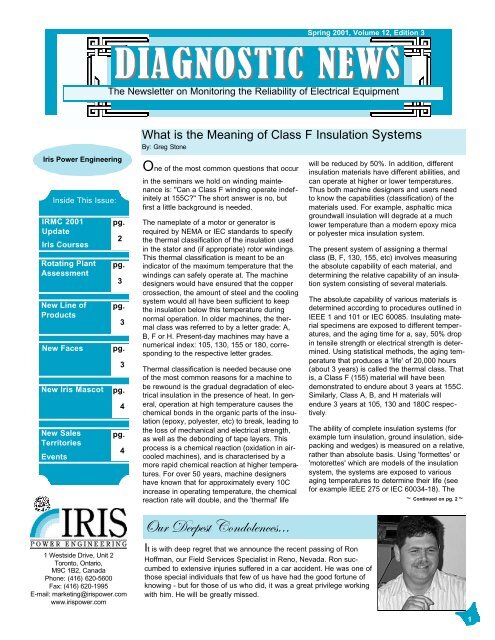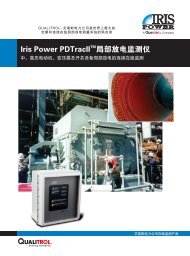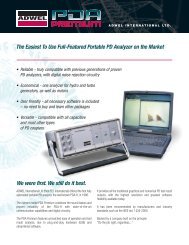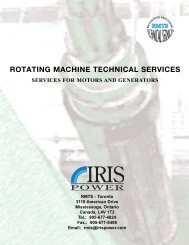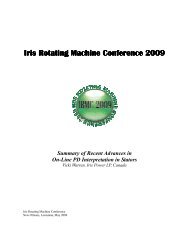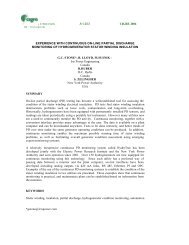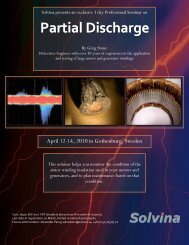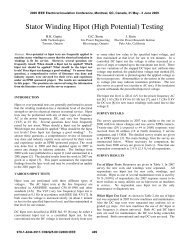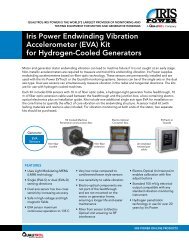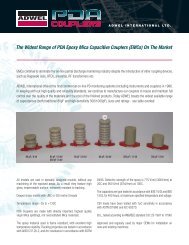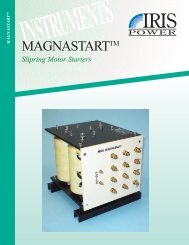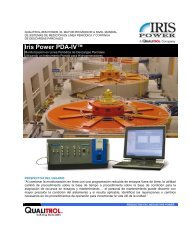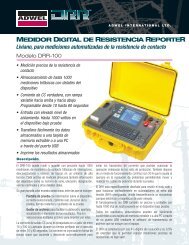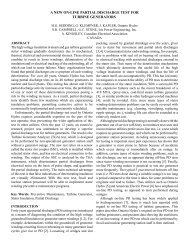to download PDF - Iris Power Engineering
to download PDF - Iris Power Engineering
to download PDF - Iris Power Engineering
Create successful ePaper yourself
Turn your PDF publications into a flip-book with our unique Google optimized e-Paper software.
. Spring 2001, Volume 12, Edition 3<br />
DIAGNOSTIC NEWS<br />
The Newsletter on Moni<strong>to</strong>ring the Reliability of Electrical Equipment<br />
<strong>Iris</strong> <strong>Power</strong> <strong>Engineering</strong><br />
Inside This Issue:<br />
IRMC 2001<br />
Update<br />
<strong>Iris</strong> Courses<br />
Rotating Plant<br />
Assessment<br />
New Line of<br />
Products<br />
New Faces<br />
New <strong>Iris</strong> Mascot<br />
New Sales<br />
Terri<strong>to</strong>ries<br />
Events<br />
pg.<br />
2<br />
pg.<br />
3<br />
pg.<br />
3<br />
pg.<br />
3<br />
pg.<br />
4<br />
pg.<br />
4<br />
What is the Meaning of Class F Insulation Systems<br />
By: Greg S<strong>to</strong>ne<br />
One of the most common questions that occur<br />
in the seminars we hold on winding maintenance<br />
is: "Can a Class F winding operate indefinitely<br />
at 155C?" The short answer is no, but<br />
first a little background is needed.<br />
The nameplate of a mo<strong>to</strong>r or genera<strong>to</strong>r is<br />
required by NEMA or IEC standards <strong>to</strong> specify<br />
the thermal classification of the insulation used<br />
in the sta<strong>to</strong>r and (if appropriate) ro<strong>to</strong>r windings.<br />
This thermal classification is meant <strong>to</strong> be an<br />
indica<strong>to</strong>r of the maximum temperature that the<br />
windings can safely operate at. The machine<br />
designers would have ensured that the copper<br />
crossection, the amount of steel and the cooling<br />
system would all have been sufficient <strong>to</strong> keep<br />
the insulation below this temperature during<br />
normal operation. In older machines, the thermal<br />
class was referred <strong>to</strong> by a letter grade: A,<br />
B, F or H. Present-day machines may have a<br />
numerical index: 105, 130, 155 or 180, corresponding<br />
<strong>to</strong> the respective letter grades.<br />
Thermal classification is needed because one<br />
of the most common reasons for a machine <strong>to</strong><br />
be rewound is the gradual degradation of electrical<br />
insulation in the presence of heat. In general,<br />
operation at high temperature causes the<br />
chemical bonds in the organic parts of the insulation<br />
(epoxy, polyester, etc) <strong>to</strong> break, leading <strong>to</strong><br />
the loss of mechanical and electrical strength,<br />
as well as the debonding of tape layers. This<br />
process is a chemical reaction (oxidation in aircooled<br />
machines), and is characterised by a<br />
more rapid chemical reaction at higher temperatures.<br />
For over 50 years, machine designers<br />
have known that for approximately every 10C<br />
increase in operating temperature, the chemical<br />
reaction rate will double, and the 'thermal' life<br />
will be reduced by 50%. In addition, different<br />
insulation materials have different abilities, and<br />
can operate at higher or lower temperatures.<br />
Thus both machine designers and users need<br />
<strong>to</strong> know the capabilities (classification) of the<br />
materials used. For example, asphaltic mica<br />
groundwall insulation will degrade at a much<br />
lower temperature than a modern epoxy mica<br />
or polyester mica insulation system.<br />
The present system of assigning a thermal<br />
class (B, F, 130, 155, etc) involves measuring<br />
the absolute capability of each material, and<br />
determining the relative capability of an insulation<br />
system consisting of several materials.<br />
The absolute capability of various materials is<br />
determined according <strong>to</strong> procedures outlined in<br />
IEEE 1 and 101 or IEC 60085. Insulating material<br />
specimens are exposed <strong>to</strong> different temperatures,<br />
and the aging time for a, say, 50% drop<br />
in tensile strength or electrical strength is determined.<br />
Using statistical methods, the aging temperature<br />
that produces a 'life' of 20,000 hours<br />
(about 3 years) is called the thermal class. That<br />
is, a Class F (155) material will have been<br />
demonstrated <strong>to</strong> endure about 3 years at 155C.<br />
Similarly, Class A, B, and H materials will<br />
endure 3 years at 105, 130 and 180C respectively.<br />
The ability of complete insulation systems (for<br />
example turn insulation, ground insulation, sidepacking<br />
and wedges) is measured on a relative,<br />
rather than absolute basis. Using 'formettes' or<br />
'mo<strong>to</strong>rettes' which are models of the insulation<br />
system, the systems are exposed <strong>to</strong> various<br />
aging temperatures <strong>to</strong> determine their life (see<br />
for example IEEE 275 or IEC 60034-18). The<br />
~ Continued on pg. 2 ~<br />
Our Deepest Condolences...<br />
1 Westside Drive, Unit 2<br />
Toron<strong>to</strong>, Ontario,<br />
M9C 1B2, Canada<br />
Phone: (416) 620-5600<br />
Fax: (416) 620-1995<br />
E-mail: marketing@irispower.com<br />
www.irispower.com<br />
It is with deep regret that we announce the recent passing of Ron<br />
Hoffman, our Field Services Specialist in Reno, Nevada. Ron succumbed<br />
<strong>to</strong> extensive injuries suffered in a car accident. He was one of<br />
those special individuals that few of us have had the good fortune of<br />
knowing - but for those of us who did, it was a great privilege working<br />
with him. He will be greatly missed.<br />
1
IRMC 2001...<br />
By: Marta Blocki<br />
<strong>Iris</strong>’s 4th Annual IRMC (<strong>Iris</strong> Rotating<br />
Machine Conference) is well on its way.<br />
We are expecting a promising turn-out<br />
this year, at the Hil<strong>to</strong>n Alexandria Mark<br />
Center in Alexandria, Virginia, commencing<br />
June 25-28, 2001. In addition <strong>to</strong> our<br />
preliminary program, we are currently in<br />
the process of releasing our final program,<br />
which will specify the final details<br />
regarding paper presentations and tu<strong>to</strong>rials.<br />
The IRMC is one of the few non-commercial<br />
conferences dealing exclusively<br />
with practical problems in operating and<br />
maintaining mo<strong>to</strong>rs and genera<strong>to</strong>rs.<br />
Apart from our technical program, we will<br />
also be offering several tu<strong>to</strong>rials,<br />
designed <strong>to</strong> educate plant maintenance<br />
personnel on predictive maintenance<br />
and test methods. Some of these tu<strong>to</strong>rials<br />
will include: Condition-Based<br />
Maintenance for Sta<strong>to</strong>r Windings, Partial<br />
Discharge Theory, Introduction <strong>to</strong><br />
Current Signature Analysis,<br />
Introduc<strong>to</strong>ry/Advanced Partial Discharge<br />
Interpretation, and much more.<br />
To <strong>download</strong> more information pertaining<br />
<strong>to</strong> this event, including conference<br />
and tu<strong>to</strong>rial registration forms, visit our<br />
website at: www.irispower.com (events<br />
section) or contact Kim Zarb at (416)<br />
620-5600 X 240 or e-mail:<br />
kzarb@irispower.com<br />
We anticipate your participation.<br />
“I enjoy the IRMC,<br />
and I think it is the<br />
best value international<br />
conference<br />
on large rotating<br />
machines around.<br />
It deals with just<br />
the issues I need<br />
<strong>to</strong> hear, has all the<br />
people I need <strong>to</strong><br />
meet ...”<br />
Rotek <strong>Engineering</strong>,<br />
South Africa<br />
What is the Meaning of Class F Insulation Systems (Continued from pg 1)<br />
life of the insulation system under this test is then compared <strong>to</strong> a<br />
'service proven' system tested in the same manner <strong>to</strong> determine<br />
the thermal classification of the new system. Thus, if a new system<br />
had about the same life under the test as a service proven<br />
system, the new system would be assigned the same thermal<br />
class as the proven system. If the new system could achieve the<br />
same life expectancy under a test, while being exposed <strong>to</strong> temperatures<br />
of 25C or more higher than the service proven system,<br />
then it would be assigned a thermal classification one step higher.<br />
For example, if an epoxy mica system could achieve the<br />
same life at test temperatures 25C higher than that obtained by<br />
an asphaltic mica system that had already been classed as Class<br />
B (130), the epoxy mica system is classed as Class F (155).<br />
Note that insulation systems (and thus the nameplate rating) are<br />
rated based on a relative system capability, not an absolute<br />
capability. The key here is the service experience of the 'service<br />
proven' system. This comes from the his<strong>to</strong>rical thermal classification.<br />
Class F systems were rated in comparison <strong>to</strong> class B systems.<br />
The Class B systems were rated compared <strong>to</strong> Class A systems.<br />
Class A systems were rated based on experience in the<br />
1950's. Unfortunately, the older insulation systems were never<br />
operated at temperatures anything near their material rating. The<br />
vast majority of machines rated Class B never operated above<br />
80C or so (far below the material rating of 130C). Thus, it is not<br />
surprising that Class B systems easily achieved a satisfac<strong>to</strong>ry 30-<br />
year winding life without thermal failure.<br />
Today, many mo<strong>to</strong>rs and genera<strong>to</strong>rs are being designed <strong>to</strong> operate<br />
at increasingly higher operating temperatures using the same<br />
Class F insulation materials. It is not reasonable <strong>to</strong> expect the<br />
same winding life from such machines, unless superior materials<br />
(Class H) are used. It is my belief that a Class F sta<strong>to</strong>r winding<br />
which operates at 145C will not survive for more than 5 <strong>to</strong> 10<br />
years without a rewind. If we wish <strong>to</strong> operate machines at higher<br />
temperatures, we will need better materials that have Class H<br />
materials.<br />
Did you Know...<br />
<strong>Iris</strong> <strong>Power</strong> <strong>Engineering</strong> offers at least three annual maintenance<br />
courses alternating throughout Canada and the United States?<br />
That’s right! You can embark upon an incredible journey in<strong>to</strong> the<br />
fascinating world of Partial Discharge, Hydrogenera<strong>to</strong>r<br />
Maintenance and/or Mo<strong>to</strong>r and Genera<strong>to</strong>r Maintenance, specially<br />
designed <strong>to</strong> help you moni<strong>to</strong>r the condition of your windings<br />
while helping you plan maintenance, based on that condition.<br />
Each course takes place at a fully equipped 4-star hotel, and the<br />
package includes a copy of course notes, lunches, snacks and<br />
refreshments - all at a price that can’t be beat. Our courses are<br />
instructed by highly trained <strong>Iris</strong> personnel with over 20 years’<br />
experience in the application and testing of large mo<strong>to</strong>r and genera<strong>to</strong>r<br />
windings.<br />
Alternately, we also cater courses based on your own personal<br />
preferences and needs. Simply select the course(s) which<br />
appeals <strong>to</strong> you most, and we will bring our course <strong>to</strong> you. For a<br />
By: Marta Blocki<br />
complete course selection list and flyer<br />
<strong>download</strong>s please refer <strong>to</strong> our website:<br />
www.irispower.com. Simply fill out the registration<br />
form and fax it back <strong>to</strong> Marta Blocki<br />
at (416) 620-1995 for quick and easy registration.<br />
Alternately, Marta can be reached by<br />
phone at: (416) 620-5600 X 241 or by e-mail<br />
at: mblocki@irispower.com<br />
We have just completed a very successful<br />
Partial Discharge course in San Clemente,<br />
CA, with over 30 participants. It is not <strong>to</strong>o<br />
late <strong>to</strong> register for our upcoming events.<br />
Upcoming courses:<br />
August 14-17, 2001 - Mo<strong>to</strong>r and Turbogenera<strong>to</strong>r Maintenance<br />
Course, Long Beach, CA<br />
November 27-30, 2001- Hydrogenera<strong>to</strong>r Course, Orlando, FL<br />
We look forward <strong>to</strong> seeing you there!<br />
2
Rotating Plant Total Condition Assessment - an Exciting New Era for IRIS!<br />
By: Andy Brown<br />
The opening of the <strong>Iris</strong> European<br />
Office based in Nantwich, UK, represents<br />
an exciting new era for <strong>Iris</strong>.<br />
The expansion in<strong>to</strong> <strong>to</strong>tal condition<br />
assessment headed by our Technical<br />
Direc<strong>to</strong>r, incorporates the traditional<br />
<strong>Iris</strong> on-line condition moni<strong>to</strong>ring with<br />
the added enhancement of services<br />
in<strong>to</strong> diagnostic moni<strong>to</strong>ring and consultancy<br />
of rotating plants involving:<br />
*Off-line specialist low and high voltage<br />
quantitative and locative investigation<br />
techniques and assessment<br />
*Rotating plant inspection, design<br />
assessment and repair specifications<br />
and techniques<br />
Off line specialist HV & LV<br />
quantitative and locative<br />
investigation techniques<br />
and assessment<br />
Technical Quality assurance<br />
from specification <strong>to</strong><br />
implementation, compliance<br />
and conformance <strong>to</strong><br />
Rotating plant in<br />
house Training<br />
*Technical quality assurance from specification <strong>to</strong> implementation,<br />
compliance and conformance<br />
Partial Discharge<br />
Result Analysis<br />
and interpretation<br />
Rotating Plant<br />
Consultancy<br />
IRIS <strong>Power</strong><br />
<strong>Engineering</strong><br />
Condition<br />
Assessment<br />
Services<br />
Specification<br />
On line Partial<br />
Discharge<br />
Techniques<br />
Rotating plant Inspection,<br />
design assessment and<br />
repair specifications and<br />
techniques<br />
Europe<br />
Conferences<br />
and seminars<br />
North<br />
America<br />
International<br />
This exciting expansion is centered initially in the UK, but the<br />
remit of the Technical Direc<strong>to</strong>r is <strong>to</strong> offer the full experience of<br />
<strong>to</strong>tal condition moni<strong>to</strong>ring services <strong>to</strong> our clients in Europe and<br />
North America. For more details on <strong>to</strong>tal condition moni<strong>to</strong>ring<br />
assessment services, please contact Andy Brown (UK) (0)1270-<br />
615020 Fax 615001, abrown@iris power.com OR Earl Goodeve<br />
(Canada), (416) 620-5600 Fax (416) 620-1995,<br />
egoodeve@irispower.com.<br />
Left <strong>to</strong> Right: Dick Smith, Trevor Thomas, Andy Brown, Kevin Handford, David Brown<br />
The European Operation formed on 1st November 2000, operating<br />
from the KOCH Glitsch Ltd. offices in the UK, consists of<br />
leading technical authorities and engineers, i.e. CEGB and<br />
Nuclear Electric / Scottish Hydro, with a combined experience in<br />
excess of 100 man years of rotating plant experience. This office<br />
has both the specialist low and high voltage equipment, including<br />
HV test transformers (rated up <strong>to</strong> 46kVA, 30kV) and experience<br />
<strong>to</strong> offer <strong>to</strong>tal condition assessment <strong>to</strong> European clients. The<br />
European team is complimented by the wealth of experience of<br />
<strong>Iris</strong> engineers in Canada and the US.<br />
<strong>Iris</strong> Launches "Trac" line of Products<br />
By: Blake Lloyd<br />
<strong>Iris</strong> is currently rolling out a<br />
line of cost effective products<br />
for continuous PD moni<strong>to</strong>ring<br />
of mo<strong>to</strong>rs and genera<strong>to</strong>rs.<br />
These include HydroTrac (for<br />
Hydraulic genera<strong>to</strong>rs with differential<br />
couplers), BusTrac<br />
(for mo<strong>to</strong>rs and small turbine<br />
genera<strong>to</strong>rs with bus couplers),<br />
and TurboTrac (for large turbine<br />
genera<strong>to</strong>rs with Sta<strong>to</strong>r<br />
Slot Couplers). In addition, we<br />
now offer a continuous air gap<br />
flux moni<strong>to</strong>r for turbo genera<strong>to</strong>rs.<br />
All of these products can<br />
be networked for remote moni<strong>to</strong>ring<br />
and acquisition.<br />
For more information visit our<br />
website: www.irispower.com<br />
FluxTrac installation at Florida <strong>Power</strong> &<br />
Light, Riviera Plant by <strong>Iris</strong>’s Supervisor of<br />
Product Development Mark Susnik<br />
Field Service Expads<br />
Byron Mazariegos<br />
has recently left the<br />
Technical Manufacturing<br />
Team <strong>to</strong> join our Field<br />
Service Specialists.<br />
Byron’s new responsibilities<br />
include coupler installations,<br />
calibrations, and,<br />
of course, partial discharge<br />
testing.<br />
By: Marta Blocki<br />
Recreationally, Byron<br />
enjoys reading and swimming<br />
(hopefully not simultaneously).<br />
He can be<br />
reached at (416) 620-5600 or at:<br />
bmazariegos@irispower.com<br />
3
Moose from the City is New <strong>Iris</strong> Mascot<br />
One of the 326 life-sized moose sculptures<br />
which have formerly grazed our Toron<strong>to</strong> streets<br />
has found a new home at <strong>Iris</strong> after being auctioned<br />
for a charity bid recently. “World Trotter,”<br />
a brightly adorned moose with flags from<br />
around the world has been moved in<strong>to</strong> our front<br />
lobby from its previous abode at Pearson<br />
International airport. The moose is a truly<br />
Canadian symbol as it represents <strong>Iris</strong>’s world<br />
presence and international market.<br />
MooseTrac<br />
By: Marta Blocki<br />
The moose has been renamed by Peter<br />
Kantardziski, our Senior Manager of<br />
International Projects <strong>to</strong> “MooseTrac,” a clever<br />
pun on our new line of TRAC instruments and<br />
the “moose track” itself. Our sales and field<br />
service staff are encouraged <strong>to</strong> bring back travel<br />
souvenirs <strong>to</strong> decorate MooseTrac, truly making<br />
it a very special <strong>Iris</strong> mascot.<br />
~ NEW DOMESTIC SALES TERRITORIES ~<br />
Clin<strong>to</strong>n Roache Derek Mitchell Jay Hamil<strong>to</strong>n Rob Lobo Rajiv Sharma<br />
Arkansas (AR) CANADA CANADA USA Connecticut (CT) Indiana (IN)<br />
Illinois (IL) Alberta (AB) New Brunswick (NB) Alabama (AL) Louisiana (LA) Iowa (IA)<br />
Missouri (MO) British Colombia (BC) Newfoundland (NF) Delaware (DE) Massachusetts(MA) Kentucky (KY)<br />
Nebraska (NE) Mani<strong>to</strong>ba (MB) Nova Scotia (NS) Florida (FL) Ohio (OH) Michigan (MI)<br />
NWT (NT) PEI (PE) Georgia (GA) Pennsylvania (PA) N. Dakota (ND)<br />
Ontario (ON) Mississippi (MS) Rhode Island (RI) S. Dakota (SD)<br />
Saskatchewan (SK) New Jersey (NJ) Texas (TX) Wisconsin (WI)<br />
Yukon (YT) INTERNATIONAL N. Carolina (NC) Vermont (VT)<br />
Antigua S. Carolina (SC) West Virginia (WV)<br />
USA Aruba Tennessee (TN) Randy Wallman<br />
Alaska (AK) Bahamas Virginia (VA) Idaho (ID)<br />
Arizona (AZ) Barbados Oregon (OR)<br />
California (CA) English Caribbean Montana (MT)<br />
Colorado (CO) Trinidad & Tobago Utah (UT)<br />
Nevada (NV) Virgin Islands<br />
Wyoming (WY)<br />
~ NEW INTERNATIONAL SALES TERRITORIES~<br />
Peter Kantardziski Joseph Mbuyi Brian Stevenson Eugene Kazlou<br />
Bosnia Macedonia Austria Australia Quebec (PQ) Korea<br />
Brazil Poland Belgium Burma Algeria Latvia<br />
Bulgaria Portugal Germany India Belarus Lithuania<br />
China Romania Great Britain Latin America Denmark Malaysia<br />
(except Brazil)<br />
Croatia Slovakia Ireland New Zealand Egypt Morocco<br />
Czech Republic Slovenia Italy Pakistan Es<strong>to</strong>nia Norway<br />
Greece Spain Netherlands Spanish Caribbean Finland Philippines<br />
HongKong Taiwan South Africa Thailand France Russia<br />
Hungary Turkey Switzerland French Speaking Singapore<br />
Africa<br />
Japan Yugoslavia Indonesia Sweden<br />
Middle East<br />
(except Egypt)<br />
Israel<br />
Ukraine<br />
<strong>Iris</strong> <strong>Power</strong> <strong>Engineering</strong> * 1 Westside Drive * Unit 2 * Toron<strong>to</strong> * Ontario * Canada * M9C 1B2<br />
Phone: (416) 620-5600 * Fax: (416) 620-1995 * E-mail: marketing@irispower.com * www.irispower.com<br />
4


